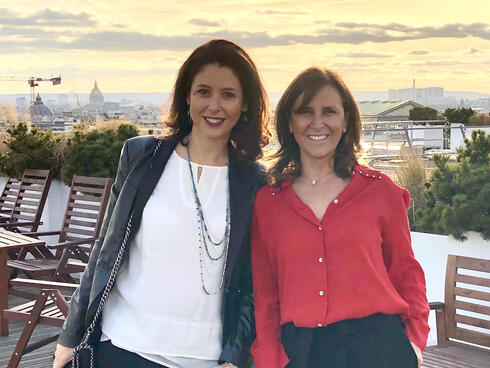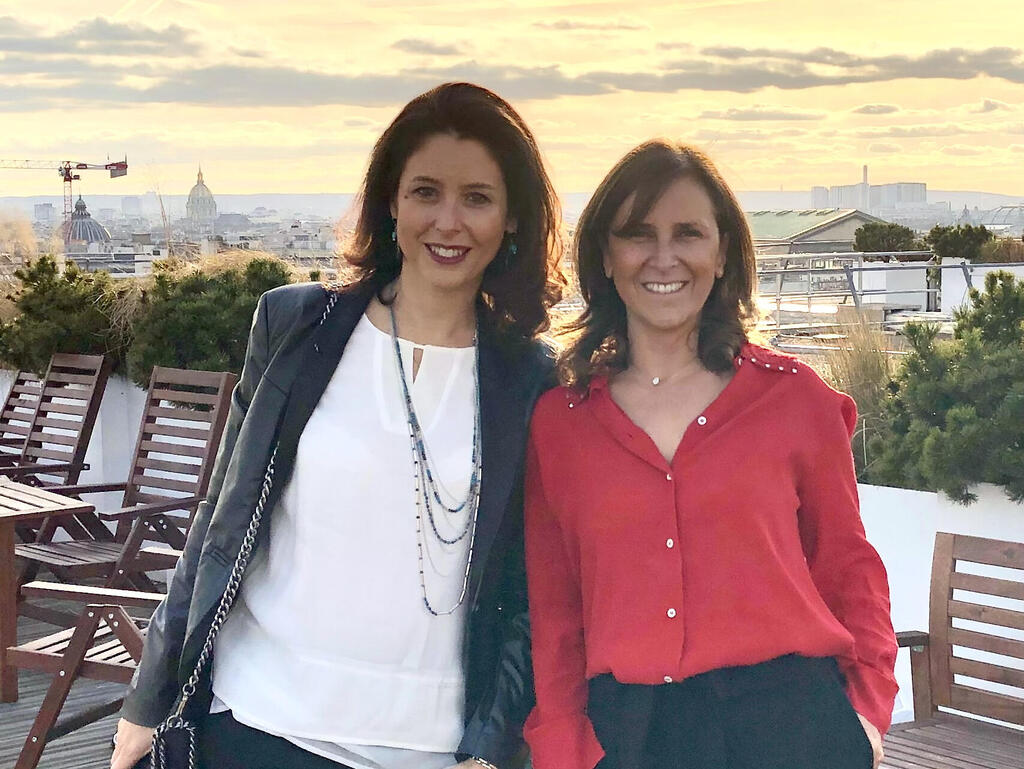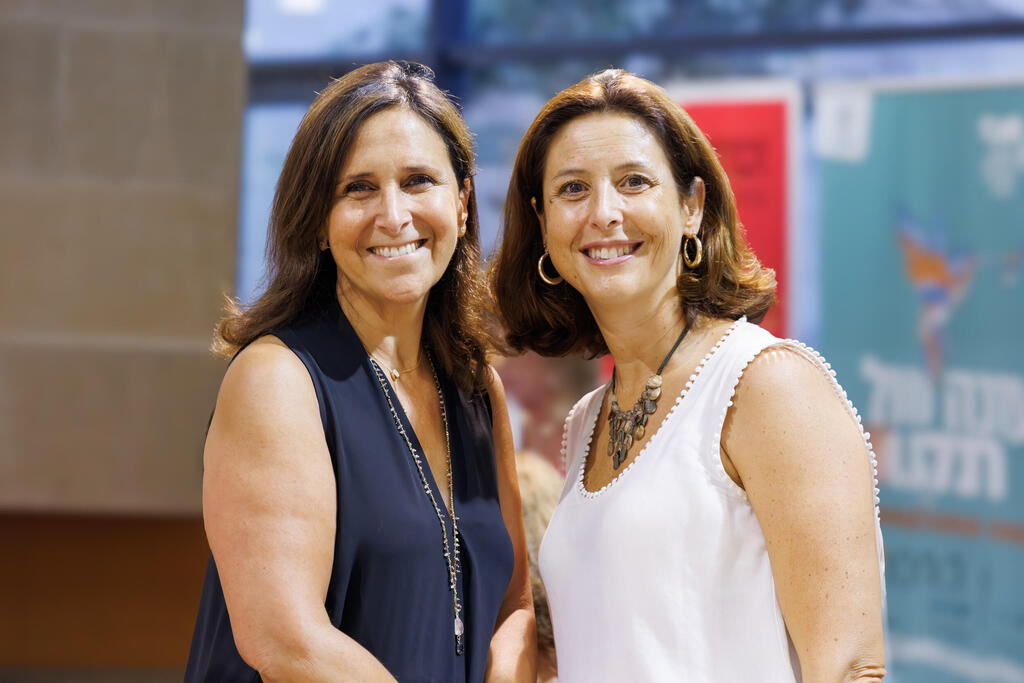
"There are a lot of things that women founders can do better than men”
Audrey Chocron and Cynthia Phitoussi spoke to CTech about founding and managing SeedIL Ventures which just raised $18 million for its second fund, about their journey as two female investors and founders in a male-dominated landscape, and how the war has impacted investment.
In a story characteristic of many partnerships in Israel’s dynamic, often serendipitous, and non-hierarchical tech ecosystem, the groundwork for SeedIL Ventures was born at a coffee shop in Herzliya. Less than fifteen years after meeting for that initial coffee, Audrey Chocron and Cynthia Phitoussi are the co-founders and managing partners of SeedIL, a VC fund focusing on seed and pre-seed Israeli startups which recently raised $18 million for its new micro fund. This is a considerable achievement in the best of times for any VC. Then add that the founders and managing partners are two women - a virtual rarity in the investment world - and that they raised their second fund in the midst of the current unprecedented geopolitical and economic woes.
When they met in 2010, Chocron and Phitoussi were recent immigrants to Israel from Paris. “We knew each other from when we both lived in London from the French community there. Then Audrey made aliyah the year before us and she was one of the first people that I reached out to when I arrived,” says Phitoussi, who was an experienced consumer market research manager for large FMCGs and an entrepreneur. Chocron spent her career at Credit Lyonnais, one of France’s largest banks, as a senior manager overseeing the bank’s investment portfolios.
“We were both really interested in entrepreneurship and wanted to do something together,” says Chocron. The two began meticulously researching the local startup ecosystem and became particularly interested in startup accelerators and incubators, and new immigrant entrepreneurs like themselves.
Their first foray into Israeli tech was to build an accelerator for new immigrant entrepreneurs in 2011 in partnership with Gvahim, a professional development non-profit for Israeli immigrants. The success of the project inspired them to pursue their own ventures. “We didn’t come from the startup world but we were amazed by the tech community here. The spirit of the entrepreneurs was contagious and we felt the need to build something ourselves,” Phitoussi says.
The two were particularly fascinated with investment after working closely with angel investors in the accelerator and opted to create their own investment structure. “We began dreaming about connecting our networks from Paris and London to the Israeli ecosystem. We would always hear from people who were interested in investing in Israeli tech but were looking for a formal mechanism to do so,” says Chocron.
After operating the accelerator for about three years, Phitoussi and Chocron decided to found SeedIL Club in 2013. They launched it in Paris and London where they presented several Israeli startups to angel investors, cultivated from their personal networks.
Despite their combined experience as entrepreneurs and investors, the two said they felt daunted. “It sounded crazy. We had no real experience with investing in startups, but we felt like we had learned so much. Now, of course, we know how little we actually knew back then,” Chocron says with a smile.
From club to fund
The two were encouraged to develop SeedIL Club into a fund by their investors as well as entrepreneurs. “We had a founder who we had invested with and he made an exit. After that, he wanted to invest with us and become an LP because he trusted us. This was the best proof that we were doing something right,” says Phitoussi.
Their first investment fund was launched in 2019, beginning with five principal investors and eventually growing to 70. The LP’s were primarily made up of angel investors who had been part of SeedIL Club, and mainly French but grew to include investors from the UK, Switzerland, the U.S. and Israel. The first fund was a micro fund, just under $10 million with a portfolio of 13 companies. Since founding the club, they have achieving four exits, including BreezoMeter, which was acquired by Google for over $200 million, as well as three secondary exits.
Their early work with angel investors was partly why the founders decided to concentrate their fund on pre-seed and seed companies. “Angels are typically investing in early stage companies, and that’s who we were mainly working with. We also felt like we could bring a lot of value to entrepreneurs at that stage and help them make connections through our networks as well as offer guidance,” says Chocron, who is also a professional coach.
SeedIL recently raised $18 million for their second fund and has invested in a combined 33 startups with a focus on B2B software companies. The fund is relatively sector agnostic, investing in AI, cyber, fintech, and healthtech among other sectors. They intend to invest in an additional 12-15 Israeli companies with this fund.
The fund prides itself on the close and hands-on approach that it gives to each startup. Every portfolio company has direct access, including guidance and mentorship, from SeedIL LP’s, many of whom are entrepreneurs themselves. “They have a whole spectrum of expertise. If we have a construction-tech company for example, they meet directly with one of our LP’s who was a founder himself in that sector. It’s special that we offer close contact,” says Chocron. “We aren’t just here to write a check. We help make introductions, with recruiting, and finding clients. It's like a marriage – trust is crucial.”
Phitoussi adds that, “We think of ourselves as a boutique VC because we are really here to support entrepreneurs. We like to keep it small because we want there to be close relationships between all parties - the startups and the LP’s.”
The founders agree that when evaluating potential startups to invest in, trust in the team involved is the most critical criteria. “The market is important, with an obvious pain point to solve as well, but the team is essential. The product will pivot at some point - how the team adapts and pivots themselves is what’s important. They also have to be open to coaching and advice,” says Phitoussi, who notes that, even at this point in their careers, the two sometimes face skepticism as female investors in a heavily male-dominated industry.
“It's happened that other investors or entrepreneurs think that they know better than us because we’re women. We’ve entered meetings where we’ll be asked ‘where is the managing partner?’ or ‘who founded the fund?’ because it couldn’t possibly be us.” However, for the most part, they say that they’ve encountered a great deal of encouragement and support including from other investors.
Both founders have observed a significant change regarding the presence of female investors in Israeli tech since they first began working in the ecosystem nearly fifteen years ago. “There were so few of us back then, but today we are part of several groups of female investors. 10% of our LPs are women, which is definitely not enough, but it's growing,” says Chocron, adding that the lack of female investors correlates directly to the lack of female-founded startups. “The fact that there are fewer women investors means that when they come to pitch in front of an assembly of men they have an added challenge.”
For the SeedIL founders it's extremely important to invest in female-led ventures, which have dwindled in the last year. SeedIL has invested in several female-founded startups including Donde Fashion led by Liat Zakay which made an exit, Blinq.io led by Tal Barmeir, and Agave Health, co-founded by Eve Mamane.
“When women founders come to us they’re often less confident and too modest, almost apologetic about asking for an investment, whereas a man in the same situation would just look us in the eye and say 'I’m raising $2 million,'” says Chocron. “Women have imposter syndrome - all of us have it. We know that a woman who decides to become an entrepreneur hasn’t made that decision lightly. She’s likely much more committed, good at multitasking, and execution-oriented. There are a lot of things that women founders can do better than men.”
Investment during war
“In 2022 we were on top of the world because we had raised our first fund and our club, Breezometer had their exit, and everyone wanted to invest. It was the heyday of Israeli tech,” says Phitoussi. However, the global tech slowdown, the judicial overhaul and subsequent unrest of 2023, followed by October 7 and Israel’s multi-front war, made the last two years uniquely challenging for all Israeli VC’s, including SeedIL.
Both Phitoussi and Chocron acknowledge this and are candid about the difficulty in raising funds as well as the decrease in foreign investment in the last two years. For SeedIL, 75% of their investment comes from foreign investors mainly concentrated in Europe and the U.S. “Even under the best of circumstances, as a fund manager, you get a lot of ‘no’s.’ Rejection is part of the journey. It's a bit like a sport and you have to get used to it,” says Phitoussi. “Now, it’s more challenging than ever to look to foreign investment.”
Despite this, the VC still managed to raise $18 million for their second fund. Perhaps this accounts for the founders’ optimism about the future of investment in Israeli tech. “The willingness to invest is still there, even if some funds prefer to stay away for now. The need for Israeli tech remains,” says Chocron.
They add that they’ve even found new investors during and even due to the war. “[Our investors] want to do good at the end of the day. We’re all here for the financial ROI, but the Jewish entrepreneurs in particular want to contribute to the Israeli economy, especially now. Some angel investors who typically invest in the U.S., London or Paris have decided to focus intentionally on the Israeli market,” says Phitoussi.
Both Phitoussi and Chocron have sons serving in the army and say that they feel a greater obligation to support Israeli tech and especially founders who are serving in reserves, of which the tech community is disproportionately represented. Phitoussi adds, “When the war started we were paralyzed for two weeks. We couldn’t do anything other than volunteer. Then we realized that our mission was to continue to invest even more in the Israeli ecosystem. If not us, then who?”
The founders observed that the status of Israeli tech has skyrocketed so dramatically since they entered the ecosystem, and that it remains even now. “Over the last 10 years there's been a growing awareness about the Israeli edge in tech. We’ve brought so many delegations who are unanimously impressed by the ecosystem. We no longer need to educate about what makes it unique. I don’t think it's going anywhere - I just think Israeli founders need to continue to innovate,” says Chocron.














